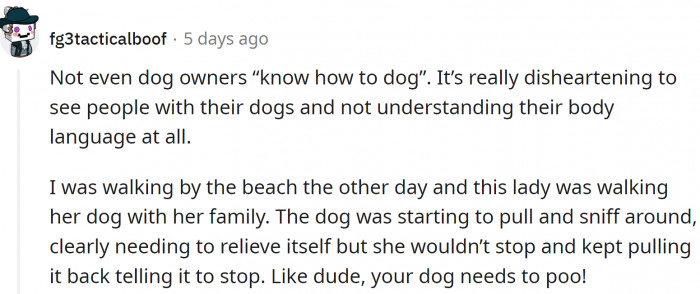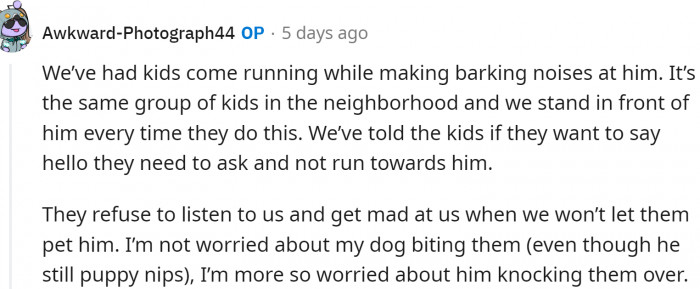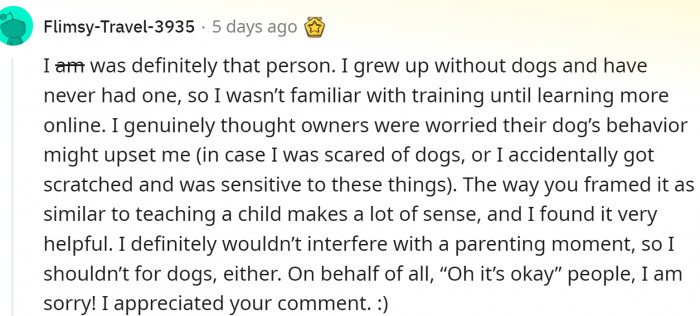Person Trying To Teach Their Dog Proper Behavior In Public Finally Meets Someone Willing To Respect Their Efforts
It is never the dog; it's always us.
Have you heard the saying, "It takes a village to raise a child?" This proverb means that an entire community must provide for and interact positively with children for them to grow in a safe and healthy environment and develop correctly.
The same goes for dogs; they are social beings that adore people.
Some dogs are overly enthusiastic and forget their manners completely when they see people. A responsible dog owner is trying to counter that by training them in public behavior.
Even though most people would say that it is very commendable, very few actually do anything to help these responsible dog owners we admire so much. In fact, almost every one of us acts in the complete opposite manner of how we should act, making our lives more difficult.
Yes, it is hard to resist petting an adorable dog that wants to play with you. They are such good boys and girls.
However, we are doing them harm by not respecting their boundaries and training (just to clarify – not respecting boundaries is always a bad thing). One dog owner wanted to publicly praise a pet store employee who acted perfectly when her dog started to misbehave.
Let's take a look at this story; we can all learn how to behave with other people's dogs. So, are you ready?
It may hurt our feelings a bit...
OP Wants to Publicly Praise One Pet Store Employee

OP Has a Young Dog, and They Are Trying to Train Him, Especially in Public Behavior.

But OP Has the Same Problem That Many Dog Owners Have - People Are Simply Overjoyed to See Dogs and Encourage Certain Types of Behavior.

Studies show that social reinforcement plays a significant role in shaping animal behavior, particularly in dogs. According to research published in the Journal of Comparative Psychology, dogs are highly responsive to social cues and often learn behaviors based on the responses they receive from their environment. This means that when bystanders reward a dog for undesirable behavior, even unintentionally, they reinforce that behavior, making it more likely to occur in the future. Therefore, responsible dog ownership involves not just training the dog but also educating those around them about the implications of their interactions.
Understanding this dynamic can help dog owners navigate public settings more effectively, as they can advocate for their training efforts by politely asking others not to reinforce unwanted behaviors.
Building a Supportive Community
Community support plays a crucial role in shaping the outcomes of dog training efforts. Dr. Adam Grant, an organizational psychologist, emphasizes that "social networks can significantly influence behavior change, not just in humans but in animals as well" on his professional website adamgrant.net. Dog owners who engage with fellow pet owners can share strategies, seek advice, and create a supportive environment that reinforces positive behaviors.
By fostering a community that values responsible pet ownership, individuals can work together to educate the public about the importance of not rewarding negative behaviors, ultimately creating a more harmonious atmosphere for dogs and their owners.
OP Went to the Pet Store with Her Dog, and the Employee There Acted as Any Person Should.

OP Is Very Appreciative

Redditors Also Commend This Employee and Added That She Probably Has Experience.

Understanding Reinforcement Dynamics
A clinical psychologist specializing in behavior analysis highlights that reinforcement comes in two forms: positive and negative. Positive reinforcement occurs when a desirable outcome follows a behavior, encouraging its repetition, while negative reinforcement involves the removal of an adverse stimulus, which also strengthens behavior. In the context of dog training, the inadvertent positive reinforcement from onlookers could lead to a cycle where the owner struggles to instill proper behavior due to conflicting messages.
Research indicates that clear communication about training goals, combined with consistent reinforcement from the dog owner, is critical in establishing proper behavior in public spaces. For instance, a study published in the Frontiers in Psychology found that owners who set clear expectations and consistently reinforced desired behaviors saw a significant improvement in their dog's public conduct.
People Are Not Educated

Some Dog Owners Also

Maybe a Protocol Would Be in Order

According to experts in canine behavior, dogs, like humans, thrive in environments where expectations are clear and consistent. The concept of 'social learning' suggests that dogs observe and imitate behaviors from both humans and other dogs. If a dog sees another dog receiving attention or treats for jumping or barking, it may mimic that behavior, assuming it will receive a similar reward. This highlights the importance of social dynamics in dog training and public behavior.
Additionally, the role of owners as advocates for their pets cannot be understated. Dog owners should feel empowered to educate others about the importance of not rewarding negative behaviors, which can lead to improved outcomes for their pets. By creating a supportive community around responsible dog ownership, behaviors can be positively influenced, benefiting both dogs and their owners.
People at Petco Are Aware of These Issues and Help a Lot

OP Shared Another Experience:

"I Don't Mind" Is the Worst Thing You Could Say

Ethical Training Practices
There is a growing movement within the field of animal behavior towards ethical training practices that prioritize positive reinforcement. According to Dr. Dan Siegel, a renowned child psychiatrist, "Positive reinforcement not only enhances learning but also strengthens the bond between the owner and the pet." This aligns with the principles of operant conditioning, where behaviors are modified through reinforcements rather than aversive techniques. Owners can implement these ethical practices by focusing on rewarding desirable behaviors consistently, ensuring that they carry treats and positive feedback when in public. By doing so, they not only help their dogs learn appropriate social behaviors but also foster a more positive public perception of their pets.
"I Don't Mind" People Say They Are Sorry!

A Down Is Not a Sit

Smart Boy

A recent study highlights the psychological impact of public interactions on pet owners. Many dog owners report feelings of frustration and anxiety when their dogs misbehave in public, particularly when others reinforce unwanted behaviors. This stress can lead to a cycle where owners become discouraged, which may further negatively affect their training efforts. Research in social psychology indicates that perceived judgment from others can heighten anxiety, which may result in less effective training and bonding with the pet.
To counteract this, dog owners can adopt mindfulness techniques to manage their reactions in public settings. Techniques such as deep breathing and positive self-talk can help maintain composure and focus on effective training rather than getting sidetracked by the behavior of bystanders.
Give Me My Pets!

Well, this post was very informative, and it probably made a lot of people sad. This doesn’t mean you can't pet good boys and girls.
However, it means you should ask for permission first. You should also ask if you can give the dog a treat.
Doing the opposite of what its owner taught him makes the dog confused. If you reward him for behavior his owner is trying to discourage, you are sending mixed signals, and it will only make your life more difficult.
Dogs learn by repeating the same action over and over and by receiving rewards when they do it right. If they start receiving rewards for bad behavior, it is detrimental.
And don't be fooled; even a smile and a pet are rewards in their eyes...
Psychological Analysis
The article highlights an interesting dynamic in dog training that reflects broader human behavior patterns: our tendency to seek immediate social rewards often overrides the long-term goals of responsible behavior. When people inadvertently reinforce a dog's misbehavior by giving attention, they not only hinder the owner's training efforts but also create confusion for the dog, demonstrating how social learning works in both animals and humans. This situation underscores the importance of community awareness and support in fostering positive behavior, as collective responsibility can lead to better outcomes for everyone involved.
Analysis generated by AI
Therapeutic Insights & Recovery
It’s clear that the relationship between pet owners, their dogs, and the surrounding community is complex and multifaceted. The principles of social learning and reinforcement highlight the importance of a unified approach to dog training, where all parties involved work together towards common goals. Mental health professionals recognize the stress that public misbehavior can cause for owners, suggesting that building supportive networks and practicing mindfulness can significantly enhance training efforts. In the end, effective dog training is not just about the individual owner and dog but about cultivating a community that respects and supports the hard work put into raising well-behaved pets.



